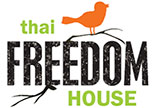About Thai Freedom House
Since its founding in 2005, by Lisa Nesser, Thai Freedom House has evolved from a basic education center to a full resource center with a social enterprise that addresses the varied needs of our population of refugees from Burma and minority peoples of Thailand. We offer the following services:
- The languages that are essential for our students in their lives now and for their future
- Vocational and arts-based workshops (including yoga and physical fitness)
- Art, music and drama therapy
- Promotion of traditional dance and dress through our Culture Preservation Project
- Health and disease prevention education
- Family planning
- Doula services
- Early childhood development education
- Translation services
- Emergency assistance
- On the job training

Mission Statement

Thai Freedom House’s mission is to provide opportunities for displaced peoples that have slipped through the cracks of society; living almost invisibly around us.
They are Refugees from war torn countries, indigenous and minority people who have been denied basic human rights and those who are impoverished and crushed by their societies’ demands.
We educate, train, nurture and inspire them to make the most of their circumstances in life by showing them how to locate and use the resources available to them, within themselves and their communities.
We hold indigenous knowledge in high regard, working to help preserve traditional values, arts and languages through our weekly language classes, traditional cultural celebrations and music and dance troupes.
Our goals in Thailand:
- To shed light on the plight of refugees from Burma and indigenous People from Thailand by providing community and international education about their situation through the interface of our cafe and website.
- To locate and share resources through a network of information about educational opportunities, health care, job trainings, legal registration and housing for refugees and indigenous and ethnic minority people in Thailand.
- To create multiple literacy in our target population through our language programs. They are taught how to read and write in the national language of their country of residence, Thailand; English to further their chances of getting a job and extending their education in the future, and Shan (the indigenous language of most of our students) to help preserve their culture and maintain pride in where they come from. We teach Burmese to ease the transition for those students who see themselves returning to their homeland in the future. Chinese language is taught as a language of trade and economy across the region.
- To bring the arts to our community with visiting artists and community projects, building bridges between the diverse communities living in Thailand and the world and encouraging self expression, release of trauma and confidence building.
See a list of our current projects with descriptions here:
Thai Freedom House is a safe place for our students and extended community to develop into confident, educated leaders in their household and community.
Our students are aged from 8 to adult, and often whole families come to study together, further reinforcing the supportive, familial environment. Over the course of the last decade, we have prepared many students for University and continue to support them in whatever way they need as they continue their higher education journey.
All of our teachers are volunteers and many of them are our own students who have attended our teacher training workshops in the past. They also volunteer within their own community teaching languages and other skills, serving as mentors to their peers. We aim to be a relevant resource for our students and to support them at whatever stage of life they’re at.
We strive to constantly improve upon our services, consulting our students regularly on best practices and areas that we need to improve or expand upon. Because of this, our students feel a sense of ownership over the organization and are invested in not only their own success but that of the project and the community at large.
Who Are We Assisting/Target Population?

Thai Freedom House focuses on assisting refugees from Burma, of any ethnic group who have escaped from the ongoing civil war and the destruction of their homes. Our members are mostly from the Shan community, the largest ethnic minority group in Burma. Shan State is close in proximity to Chiang Mai so therefore there is a larger concentration of Shan in the area. We are, however, open to any student that hasn’t had access to education, regardless of nationality, ethnicity, political stance, religion, sex, sexual preference, ideologies or age.
To enter into the program there are only three requirements: To have had limited or no access to education; to know someone already attending the program; and to be willing to make a commitment to come for the entire three month term and try their best. No one comes to Thai Freedom House without knowing someone else, usually either from a shared workplace or housing situation. Current students may introduce a family member or fellow villager, newly arrived from Burma, to our programs. This keeps the community tight, like a family. Many people in the program say that this is their favorite thing about the center: that it is like a family or village community.
When in Burma, our members lived in community based villages, having a village head or temple to act as the meeting grounds for traditional ceremonies, festivals and family events such as weddings and baby naming ceremonies. Now that they are living in another country, TFH acts as their village meeting space. As a result of having such a close, respectful community, several couples have met here, courted, married, and now have children who are part of our Early Childhood Education Project. This highlights the fact that we have become, over the last 10+ years (since 2005), an integral and constantly evolving part of the community.
We also have students from the ethnic minority groups of Thailand who, for various reasons, haven’t had access to adequate education. They usually come from rural areas where no schooling was available and are now living in the city for work since their land has been taken and redistributed. They may not have the appropriate identification for enrollment into the Thai system even though they are indigenous to the country.
A smaller number of our students are Thai nationals from rural areas, relocated to the city or from very poor urban families that have worked since childhood and never had an opportunity to attend school. They are usually past traditional school age and can find no place in the mainstream education system but still strive to learn and better their lives.
Why Do They Need Assistance?

People flee Burma to escape the violence and oppression of civil war, forced labor, rape as a tactic of war, ethnic group fighting, lack of access to basic human rights, lack of educational opportunities, lack of access to health care, no freedom of expression, religion or political views. Now in Thailand they have to deal with racism and police or military harassment every day. They are seen and labeled as illegal immigrants or migrant workers, but in fact they are legal refugees by the international definition:
“The 1951 Refugee Convention spells out that a refugee is someone who ‘owing to a well-founded fear of being persecuted for reasons of race, religion, nationality, membership of a particular social group or political opinion, is outside the country of his or her nationality, and is unable to, or owing to such fear, is unwilling to avail himself to the protection of that country’.” It is also stated that “refugees are people fleeing conflict or persecution. They are defined and protected in international law, and must not be expelled or returned to situations where their life and freedom are at risk.” (UNHCR.ORG.)
Not having signed the 1951 International Convention on Refugees put forth by the UN, the Thai government can ignore the rights of these people to a decent living and to education among other basic human rights. Many of them are unable to access the correct documentation to enter into a government school, and so many of the children end up working from a very young age. Other factors contributing to this include the lack of stability in their parents’ employment, being taken advantage of by employers who do not pay them for months or being moved from construction site to construction site with no say, so they cannot enroll in a school. The majority of refugees from Burma end up working in the service industry with no protection or documentation and many of them are living and working on construction sites around Chiang Mai.
How Do We Assist Them?

First and foremost, we listen. When doing aid work it can be easy to get caught up in thinking about what you want to offer and what you think is best for the development and sustainability of a community, but at TFH we are here to respond to the already identified needs of our community. We strongly believe that that is what has contributed to our long lasting sustainability and respect in the community for over ten years. As issues and challenges arise for our students and their families, they tell us how we can best support them. As our students grow, become teenagers, marry, have children, occasionally relocate back to Burma, open their own small businesses or strive for higher education here in Thailand, we respond by expanding upon services, developing new programs and bringing in experts or consultants to help them raise to those challenges.
Unlike the traditional school systems across Asia, we also introduce them to problem solving skills, critical thinking and debate skills, project planning and implementation skills, goal setting and wider viewpoints about the challenges that they face so that they can navigate their options and decide what is best for themselves with as much information as possible.

